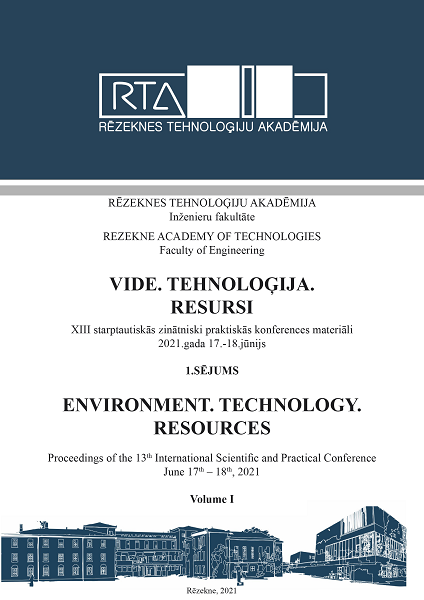CLIENT RELATIONSHIP MANAGEMENT IN LATVIAN RETAIL ENTERPRISES UNDER COVID-19 CIRCUMSTANCES
DOI:
https://doi.org/10.17770/etr2021vol1.6573Keywords:
consumer, consumer satisfaction, consumer relationship management, retail tradeAbstract
Ensuring customer satisfaction is the key to a successful retail business. The process of attracting new customers always involves more money, time and energy. In order for a company to retain existing customers and build relationships with them, one of the basic tasks is to know the factors and levels that affect their satisfaction. In the current situation of COVI-19, this poses even greater obstacles and challenges. In order to identify the company's ability to ensure competitiveness in a crisis situation, the authors have set the goal of the research to study the factors influencing retail consumer behavior under COVID-19 circumstances.
This study will provide retail businesses with an understanding of the need for consumer relationship management in a restricted situation. From the scientific point of view, the authors have analyzed the theoretical aspects and summarized the approach to the understanding of buyers' behavior in crisis conditions. As a result of the research, the authors conclude that even in crisis situations, companies can manage the relationship with consumers and shape the attitude of buyers, which can be one of the tools for ensuring competitiveness.
References
Anderson, J. L., Jolly, L. D., Fairhurst, A. E. (2007). Customer relationship management in retailing: a content analysis of retail trade journals. Journal of Retailing and Consumer services, November, 14 (6), pp. 394-399.
Arhipova, I., Bāliņa, S. (2006). Statistika ekonomikā un biznesā. Rīga: Datorzinību centrs.
Butcher, S., Stephan, A. (2002). Customer Clubs on Loyality Programms. Abingdon, Oxsn, GBR: Gower Publishing Limited.
Covid-19 ierobežojumi tirdzniecības jomā būtiski ietekmējuši nozares rezultātus janvārī, FM Preses relīze 26.02.2021. Iegūts 13.03.2021. https://lvportals.lv/dienaskartiba/325374-fm-covid-19-ierobezojumi-tirdzniecibas-joma-butiski-ietekmejusi-nozares-rezultatus-janvari-2021
De Pelsmacker, P., Genens, M., Van den Bergh, J. (2007). Marketing Communication, 3rd ed., Prentice Hall, pp. 397–407, ISBN: 9780273721383.
Dyer, J. H., Harbir, S. (1998). The Relational View: Cooperative Strategy and Sources of interorganizational Competitive Advantage. Academy of management Review, 23 (4), pp. 660–679.
Hofstetter, J. (2006). Accessing the contribution ot ECR. ECR journal, vol. 6 issue 1, pp. 20–29.
Evans, M. (2012). Consumer Behavior. Hoboken, NJ: Willey.
Griffin, G. (2002). Customer Loyality. How to Earn it How To Keep it. San Francisco: Jossey Bass.
Harvey, L. (2015). How to provide customer intelligence. [Online] no http://paperzz.com [Accessed 03/08.2015].
Kim, J. W., Chi, J., Qualls, W., Park, J. (2004). The impact of CRM on firm and relationship lever perfomance in distribution networks. Communication of the Association for informations Systems. Vol. 14, pp. 632-652.
Kotler, P., Keller, K. L. (2006). Marketing management. Hoboken, NJ: Prentice Hall.
Krauss, M. (2002). At many firms, technology obscures CRM. Marketing News, 2002, 18 March.
Kristapsone, S., Kamerāde, D.u.c. (2011). Ievads pētniecībā: stratēģijas, dizaini, metode. Rīga: RaKa.
Liniņa, I. (2017). Customer Relationship Formation and Management in Retal Trade Enterprises in the Baltics Countries. Integrated and Sustanaible Regional Development Marketing and Sustainable Comsumption Book Series: Economic Science for Rural Development, Issue: 4, pp. 300-306.
O`Reilijs, D., Gibass, D. (2000). Darījumu attiecības ar pircējiem.. Rīga, Biznesa augstskola Turība.
Payne, S. L. (1978). The Art of Asking Questions. Princeton, N.I., Princeton University Press, pp.158–176.
Reisheld, F. (2003). The One Number You Need to grow. Horvard Business Review, 81(12), pp. 46-54.
Seifert, D. (2001). Efficient Consumer Response. Hampp, Mering.
Smith, P. R., Zook, Z. (2011). Marketing Communication. New York: Kogan Page, pp. 61–86.
Teece, D. J., Gary, P., Amy, S. (1997). Dynamic Capabilities and Strategic Management. Strategic Management Journal, 18(7), pp. 509–533.
Toedt, M. (2015). The contribution of customer relationship management to sales perfomance in the hotel business. Summary of Doctoral Thesis, University of Latvia, Rīga.
“A ‘layman’s’ explanation of Ultra Narrow Band technology,” Oct. 3, 2003. [Online]. Available: http://www.vmsk.org/Layman.pdf. [Accessed: Dec. 3, 2003].
Thomson ISI, EndNote 7. [CD-ROM]. Berkeley, Ca.: ISI ResearchSoft, 2003.



